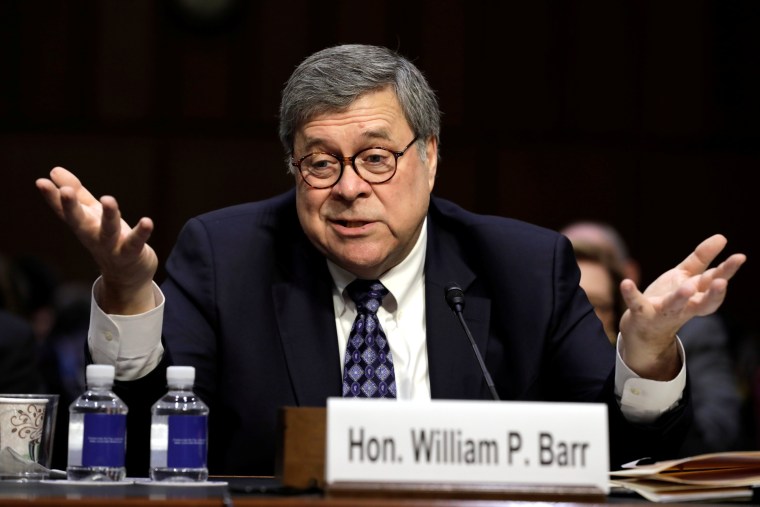Two days after receiving Special Counsel Robert Mueller's findings, Attorney General William Barr released a four-page, March 24 memo, characterizing elements of Mueller's report, but failing to quote so much as a whole sentence from the document.
A political frenzy soon followed, including bogus claims from Donald Trump about being "exonerated" by a report he had not read. Despite the rush to judgment, and more than a few observers accepting Barr's assessment at face value, a simple question hung over the debate: when, if ever, will Americans get to see the actual Mueller report?
The president's handpicked attorney general, just six weeks into his new tenure, tried to shed new light on that question in a follow-up memo, issued on Friday afternoon.
Special counsel Robert Mueller's report on his investigation into Russian election interference will be released publicly, with some redactions, by mid-April and possibly sooner, Attorney General William Barr said in a letter Friday.In a letter to the heads of the Senate and House Judiciary committees, Sen. Lindsey Graham, R-S.C., and Rep. Jerrold Nadler, D-N.Y., Barr wrote that Mueller's office was helping to determine what would be redacted and that the report -- which Barr said was nearly 400 pages -- would be released to Congress without the White House reviewing it first.
At face value, these top-line details are certainly of interest. It's good to know, for example, that the special counsel's findings span nearly 400 pages -- the original Barr memo, in other words, was roughly one percent the length of the report it attempted to characterize -- and some iteration of it will reach the public over the next couple of weeks.
But it's worth looking past the surface-level information on this, because as Rachel explained on the show, the attorney general did a lot more than just offer a status update.
For example, we're apparently supposed to stop calling his summary a summary.
"I am aware of some media reports and other public statements mischaracterizing my March 24, 2019, supplemental notification as a 'summary' of the Special Counsel's investigation and report," Barr wrote. He added, "My March 24 letter was not, and did not purport to be, an exhaustive recounting of the Special Counsel's investigation or report. As my letter made clear, my notification to Congress and the public provided, pending release of the report, a summary of its 'principal conclusions' -- that is, its bottom line.... I do not believe it would be in the public's interest for me to attempt to summarize the full report or to release it in serial or piecemeal fashion."
We're accustomed to some weird developments as part of this controversy, but Barr's pushback against the word "summary" was, at a minimum, unexpected. The attorney general's non-summary summary was, what, an unrequested description of some undefined aspects of the Mueller report?
And why is it, exactly, that Barr is suddenly concerned -- after five days of political turmoil, fueled by his own document -- that people might perceive his characterizations of the Mueller report as a summary? Maybe he's suddenly taken a pedantic turn, maybe he's concerned about the gaps between his document and the special counsel's, or maybe the attorney general is eager to alter public expectations ahead of partial disclosure in mid-April.
Also note, as part of Barr's latest letter, he appears to have moved the goalposts on what will be cut from the Mueller report before anyone, including members of Congress, can see it. In his non-summary summary, the attorney general said he intended to exclude grand-jury information -- a controversial position in its own right -- as well as information related to ongoing investigations and cases.
Late last week, however, Barr decided to add a couple of additional categories: the attorney general also intends to cut out information important to the intelligence community and information that would "unduly infringe on the personal privacy and reputational interests of peripheral third parties."
On the first point, it's very hard to imagine Mueller and his team leaving sensitive intelligence in their report, asking the attorney general to take the lead on redactions. But on the second, how and why did Barr come up with the standard of hiding information that some unknown parties might find embarrassing? Who gets to decide who counts as a "third party"? Is it up to the attorney general to define "peripheral" in a way he likes?
And since when does the head of the Justice Department consider it his job to shield the "reputational interests" of people related to a special counsel's investigation?
On Capitol Hill, meanwhile, Democratic leaders set a deadline for Barr to submit the full Mueller report, without redactions, by April 2 -- which happens to be tomorrow. That deadline has not been extended.
Also of interest, House Judiciary Committee Chairman Jerry Nadler (D-N.Y.) expects to receive all of the grand jury information the attorney general intends to exclude, and there's ample precedent on Nadler's side: in every similar investigation, including Watergate, lawmakers had access to grand jury information.
Watch this space.
